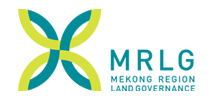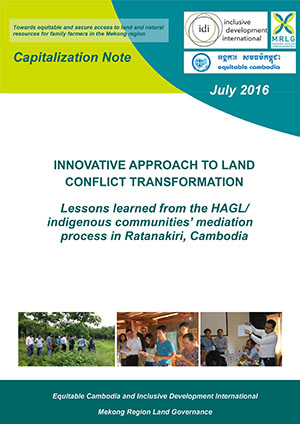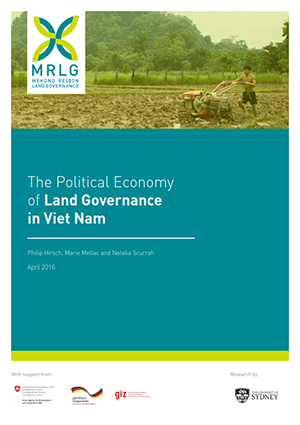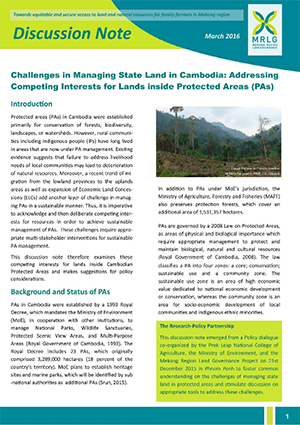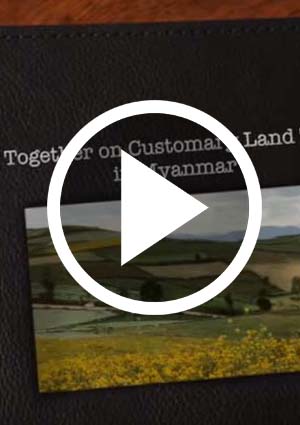Location
Project Description
Land governance is at the center of development challenges in Cambodia, Laos, Myanmar and Vietnam. Governments are revising land policies and practices in order to face these challenges. The project aims to (i) assist the emergence of more favorable policies and practices for securing the rights and access of family farmers to land and natural resources; and (ii) to strengthen the effectiveness of concerned stakeholders through learning, alliance building and regional cooperation.
The MLRG project is based in Laos, with local offices in three other countries: Cambodia, Myanmar, and Vietnam. It supports a wide range of activities (training, exchanges, case studies, focused research, documentation, workshops and seminars) at local, national and regional levels.
The MRLG can support initiatives through three component windows, the first is a learning and advocacy ongoing activity platform supported by National Facilitators in each country. The second two are funded through our Grant Facility open to all stakeholders based on demand and proposals prepared. A short term and immediate response window is the Quick Disbursement Fund (QDF). The second longer term and competitive proposal process is the Innovation Fund (IF). The learning and advocacy activity platform prepared on an annual basis in consultation with stakeholders to organize information collection, analysis, and dissemination, and for horizontal learning and structured learning visits, coaching and pairing, training and organizational strengthening, at the national and regional level.
Members:
Resources
Displaying 81 - 85 of 108Innovative Approach to Land Conflict Transformation: Lessons Learned From the HAGL/Indigenous Communities’ Mediation Process in Ratanakiri, Cambodia
In the Mekong region, conflicts between local communities and large scale land concessions are widespread. They are often difficult to solve. In Cambodia, an innovative approach to conflict resolution was tested in a case involving a private company, Hoang Anh Gia Lai (HAGL), and several indigenous communities who lost some of their customary lands and forests when the company obtained a concession to grow rubber in the Province of Ratanakiri. The approach was developed by CSOs Equitable Cambodia (EC) and Inclusive Development International (IDI) with the support of QDF funding from MRLG.
The Political Economy of Land Governance in Viet Nam
This country level analysis addresses land governance in Viet Nam in two ways. First, it summarises what the existing body of knowledge tells us about power and configurations that shape access to and exclusion from land, particularly among smallholders, the rural poor, ethnic minorities and women. Second, it draws upon existing literature and expert assessment to provide a preliminary analysis of the openings for and obstacles to land governance reform afforded by the political economic structures and dynamics in the country.
The Political Economy of Land Governance in Viet Nam
This country level analysis addresses land governance in Viet Nam in two ways. First, it summarises what the existing body of knowledge tells us about power and configurations that shape access to and exclusion from land, particularly among smallholders, the rural poor, ethnic minorities and women. Second, it draws upon existing literature and expert assessment to provide a preliminary analysis of the openings for and obstacles to land governance reform afforded by the political economic structures and dynamics in the country.
Challenges in Managing State Land in Cambodia: Addressing Competing Interests for Lands Inside Protected Areas (PAs)
Protected area management is threatened by weak articulation between the goals for conservation, national development and local livelihoods. This discussion note examines the competing interests for lands inside Cambodian Protected Areas and makes suggestions for policy considerations.
Customary Tenure in Myanmar
This video is based on the combined efforts of 5 civil society organizations and ethnic youth organizations (88 Generation, Point, FLU, KYO&TSYU) to document local Customary Tenure practices in different villages throughout the country, in the states of Shan North, Shan South, Magwe and Kayah, with the support of MRLG. It’s explains how they implemented the documentation of Customary Tenure practices. The video also explains what customary tenure is, based on the local communities point of view and practices, and why CT recognition is important to them.

